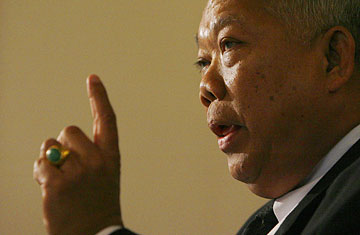
Thailand's Prime Minister Samak Sundaravej in Bangkok on February 8
Varin is one of the most renowned soothsayers in Thailand, where occult beliefs are common. His famous patrons are thought to include the former head of the military junta, Sonthi Boonyaratglin, a retired general who in September 2006 oversaw Thaksin's bloodless overthrow, ushering in more than a year of military rule before the elections last December that brought Samak to power. (The current P.M. openly campaigned as Thaksin's proxy, since the former leader is currently barred from re-entering Thai politics.) At an astrological ceremony on Sunday, Varin played host to associates of the military regime who have made no secret of their distaste for Thailand's new Prime Minister. Samak fired back, accusing Varin of political favoritism and pointing out cases in which the fortuneteller's prognostications had failed to materialize. Case in point: Varin forecast that the opposition Democrat Party, not Samak's People's Power Party, would win last December's polls.
Varin predicts political trouble will heighten in late April or May. But it hardly takes a professional soothsayer to come to the conclusion that the current government is on shaky ground. Although Samak's party is popular in the rural northeast, the right-wing politician counts far fewer supporters among Bangkok's middle class and political elite. Even Samak himself indicated last month that he had been warned of a possible coup attempt—although the Prime Minister did not elaborate details of the purported plot.
Part of the instability comes from the same divisions that led to Thaksin's military ouster in 2006. In the months before the billionaire-tycoon-turned-P.M. was deposed, hundreds of thousands of Thai citizens flooded the streets to rally against him. Among other things, they were incensed over a multibillion-dollar business deal in which Thaksin and his family did not pay any tax. By removing Thaksin from power, the junta may have thought it could unite an increasingly polarized country. But even after the military regime publicized a litany of complaints against Thaksin—alleged corruption, abuse of power and even disrespect for the country's beloved monarch—his populist policies still resonated with many rural poor. Samak's victory came precisely because of support from these voters, who still believe that Thaksin—or, failing that, his proxy—is the only person who will help them with microfinancing or affordable healthcare.
Little wonder, then, that Samak's new cabinet, which even the P.M. has dubbed an "ugly duckling" cabinet, appears focused on promoting people with ties to Thaksin. Thaksin's former spokesman is now Foreign Minister, while the new Finance Minister is a friend of the ousted P.M. who has little economics training. Three wives of men who were members of Thaksin's dissolved political party were also named cabinet members. To top it off, Thaksin's brother-in-law is deputy prime minister.
Despite this odd assortment, Samak has vowed to get down to business and tackle Thailand's problems, ranging from underwhelming economic growth to rising consumer prices. But with a respected fortuneteller predicting the demise of this government, many Thais aren't confident that Samak will survive long enough to accomplish much. The question, then, is whether Samak's successor might have more time to fix Thailand’s troubles. On this point, sadly, Varin the soothsayer isn’t talking.
